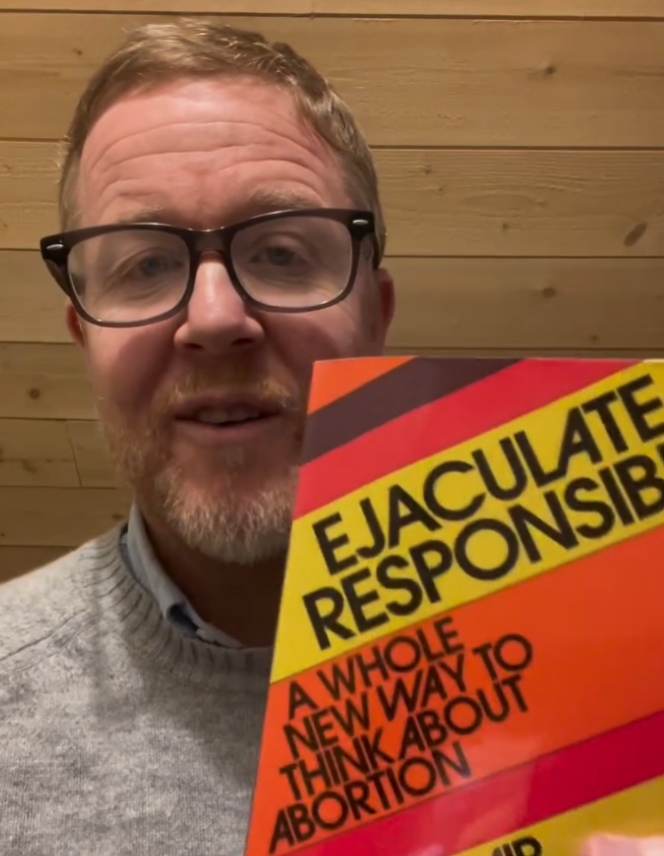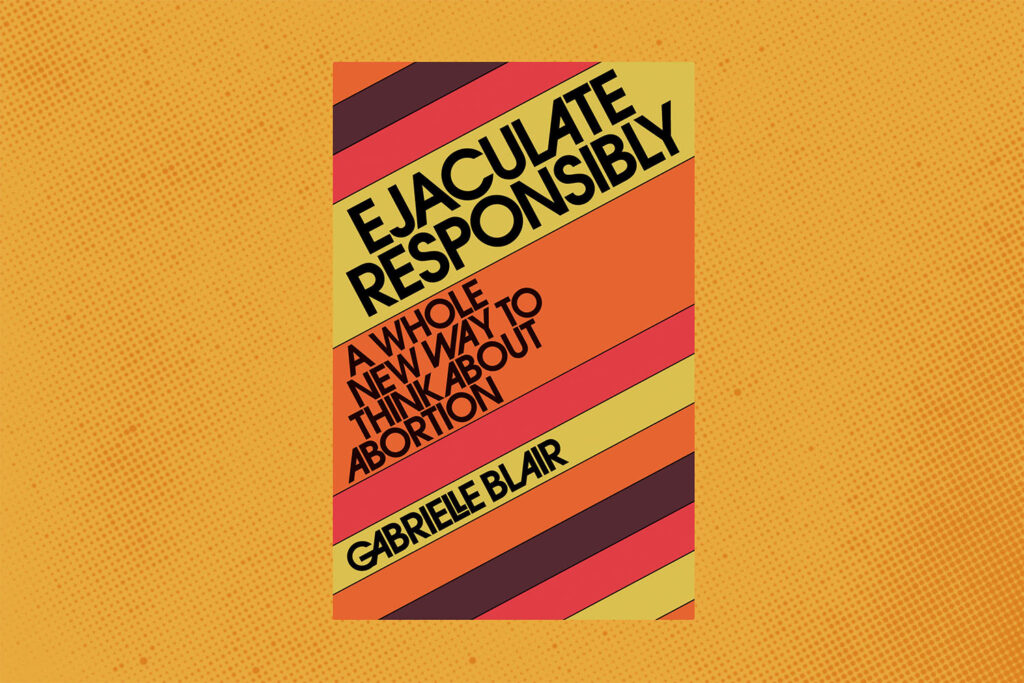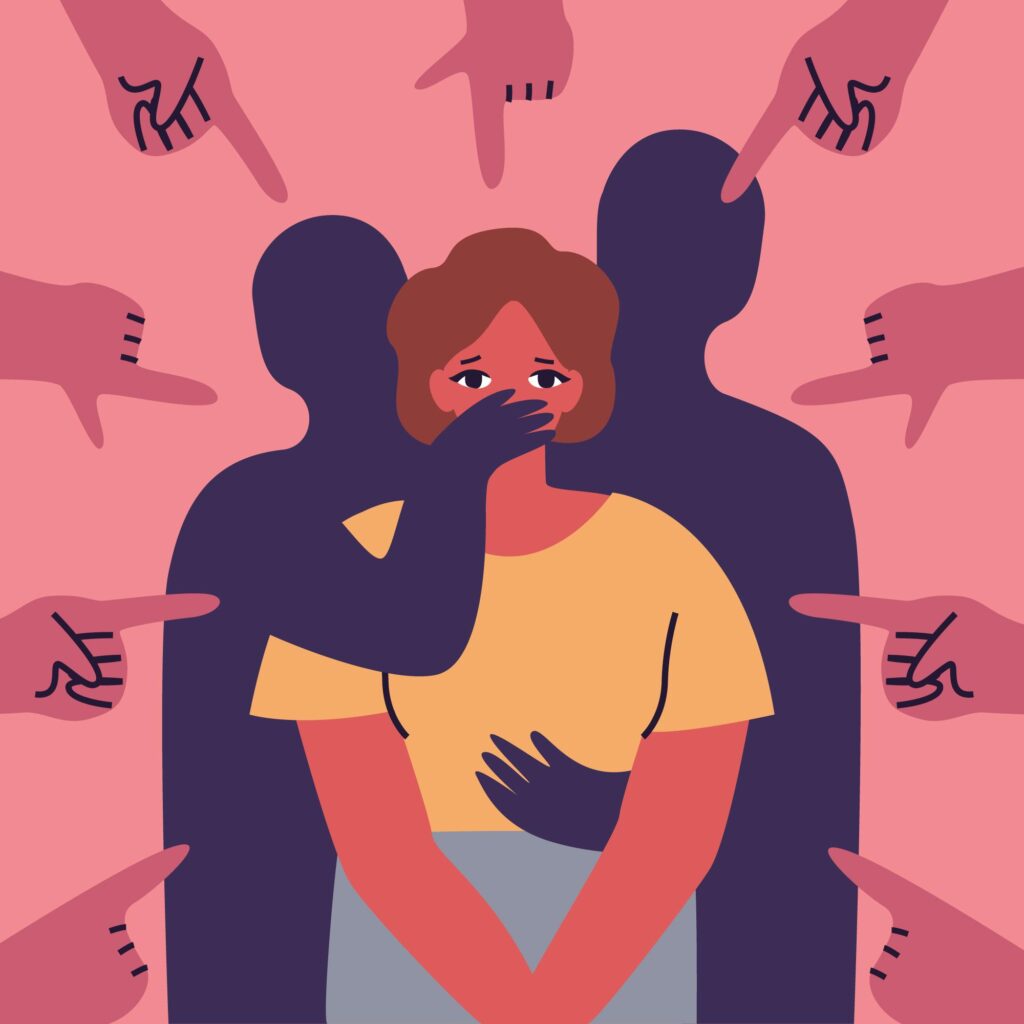“a way that a man could be a hero”
Amy is joined by Ben Blair to discuss Gabrielle Blair’s Ejaculate Responsibly: A Whole New Way to Think About Abortion, plus contraception, sex education, and how to get to the roots of unwanted pregnancy.
Our Guest
Ben Blair

The Discussion
Amy Allebest: Longtime listeners might remember an especially excellent episode during our second season when public intellectual Gabrielle Blair, also known as Design Mom, joined us to discuss abortion rights. We specifically discussed Gabrielle’s viral Twitter thread in which she challenged men to take responsibility for their ejaculations, writing, “If you want to stop abortion, you need to prevent unwanted pregnancies. And men are 100 percent responsible for unwanted pregnancies.” I remember that my jaw dropped when I first read that radical reframing of the narrative, taking the blame off of the women who suffer from unwanted pregnancies and instead holding men accountable for their actions. If you missed that episode, I definitely recommend scrolling back to season two, episode 17, and having a listen. Gabrielle is absolutely brilliant. And in case you haven’t heard, since that episode’s release, her original Twitter thread has been expanded, revised, and published as a book, The New York Times bestseller, Ejaculate Responsibly: A Whole New Way to Think about Abortion. It’s a phenomenal read. And just a few weeks ago, I was lucky enough to sit down with Ben Blair, Gabrielle’s husband, and an active contributor to their Ejaculate Responsibly project. He wanted to flip the script and interview me as a reader of the book and as a huge supporter of their mission, so that’s the episode we’ll be sharing today. Here’s Ben Blair and I talking about Gabrielle Blair’s essential text, Ejaculate Responsibly. Enjoy.
Ben Blair: Okay. Hello, Amy.
AA: Hey, Ben!
BB: Thanks so much for meeting to talk about Ejaculate Responsibly.
AA: I’m super excited to be here.
BB: I’m super excited to talk with you. I just want to hear your thoughts on Ejaculate Responsibly. I know you have a lot of expertise on patriarchy and how patriarchy has structured our society to help and benefit (supposedly) some people and oppress or punish or keep other people down. I want to hear your perspective on any of these questions, so I’ll just get into it. What made you pick up a book called Ejaculate Responsibly?

AA: Well, I was anticipating the book because I had happened upon Gabby’s Twitter thread on abortion. It was forwarded to me by somebody, I don’t remember who, and it had a huge effect on me when I read the original Twitter thread. It really did make me see the whole issue in a completely different way. I read it many times, I forwarded it on to many other people, I referenced it in a graduate school class that I took on women’s health and human rights. So I knew that there was a forthcoming book and I was really excited to read it.
BB: Maybe could you talk a little bit about what it was that shifted your perspective from the Twitter thread.
AA: Yeah, I think the main thesis, at least the way I see it, the main thesis of the book, which is a perspective shift. Well, I guess I’ll put it this way. I have an analogy for you. We had some trees in our yard that were having issues, they weren’t growing very well, and the branches were dying. And we had some people come out and look at the trees, they had sprays that they were spraying on the needles and they had different things they were doing to treat what they saw as the problem. And then we had this master arborist come and he’s like, “Oh, you’re treating the branches. The problem is actually the roots.” And he dug in a little bit and he explained to us what the problem had been. The problem was the way the tree was planted and it was the root system that was sick, but we were seeing the results out in the branches. And I thought of that when I read Ejaculate Responsibly, because I thought that the way we look at abortion is that we’re treating it when a woman already has an unwanted pregnancy. And when does life begin? People on the political right think this and the political left think this and religious people think this about what to do. What if we looked at the root instead? What if we looked at what causes an unwanted pregnancy? For me, that was the mind shift when I initially read the Twitter thread. Like, “Oh my gosh, there’s a way to prevent the whole thing.” That was the major shift is getting to the actual root of the issue instead of trying to treat it out on the very ends of the branches.
BB: Love it. So what causes unwanted pregnancies?
AA: Well, irresponsible ejaculations, Ben. Haha. I mean, that was the big aha moment. First of all, knowing the data that there’s a 1 percent of abortions that happen because of medical conditions in the mother or the fetus, and it’s a wanted pregnancy and that’s tragic when that happens. But 99 percent of abortions are caused by unwanted pregnancy. And that’s the brilliance of this book. An unwanted pregnancy is caused by a sperm being deposited in a vagina and finding an egg where the partners are not trying to conceive. So the book goes through 28 ways that say here is why it’s actually the ejaculation that causes the pregnancy. So the onus, the power to prevent, is really in the owner of the sperm, the person who would deposit that sperm somewhere where a baby isn’t wanted, that onus should be on the man.
BB: Mm-hmm. Agree. And was there a difference between your initial response to the Twitter thread or the book when you first read the book and your response over time? Or has your response to these ideas evolved or changed over time?
AA: It has. I guess when I think about my personal life, when I first read the Twitter thread on abortion, I hadn’t really started a study of the system of patriarchy yet in my life. I just read it and it made sense to me, but I didn’t really understand the structural, cultural underpinnings of those arguments in terms of understanding structural and cultural, social patriarchy yet. So the more I’ve understood those things, the more context I have around those ideas. The ideas are still completely sound and I just have more understanding of why. So, yes, my understanding has grown kind of around it and it makes me all the more converted and committed to those ideas because they really are true.
BB: Well, I hope some of the questions will prompt you to talk more about that. Are there any initial ideas where you think, after studying the idea of patriarchy, here are a couple things right away that jump out about this idea of Ejaculate Responsibly or the issues that this book works to resolve?
AA: Yeah. One of them that comes to mind for sure is the idea that we have assumed that women would do all the work of preventing pregnancy. We really do. And I want to say at the outset here, too, in this specific conversation, but when I talk about patriarchy in general, I honestly don’t blame individual people for having these attitudes. And the reason I say that right now is because what came to my mind is my own marriage. And I really love my husband, I’m married to a really great man, and we totally put that responsibility on me. We both did. We just grew up with that assumption. So when I talk about patriarchy, I’m not saying like, “These evil men who are trying to keep women down.” But it is a structure that centers men and that means it centers men’s comfort and pleasure, it turns out. And the world that was built hundreds or thousands of years ago that we’re still living in all these structures, was built by men and for men, and we’re all just participating in it. So one of the things that I was going to say is that we put the responsibility on women of preventing pregnancy, and then an argument that I’ve heard a lot too, is men saying like, “Well, why don’t women just tell the man to wear a condom? Why don’t the women just insist that he takes responsibility for the contraception?”
the onus, the power to prevent, is really in the owner of the sperm, the person who would deposit that sperm somewhere where a baby isn’t wanted, that onus should be on the man
And the more I’ve read and the more women I talk to, and the more I look inside my own mind and my own social patterns with all the men I know, the more I see how girls are socialized from the time they are born to please men. Because if men are in control in politics, in religion, in the home, in school, in the arts, in the sciences, in every single cultural institution that we have and in your own family relationships. The thing is, a baby, when it’s born, wants to keep itself safe and wants to be loved and wants to be accepted. You are getting one million micro-messages day by day that you need to please men. And sometimes there are bad actors, of course there are, and really horrible behavior on the part of men. But a lot of times men don’t even know that that’s what their wife is feeling. The wife doesn’t even know that’s what she’s feeling, or a girlfriend or whatever. But if you get even the slightest message of, “Oh, he prefers not to wear a condom,” or “he doesn’t like girls who are really assertive and speak up for themselves,” we are trained to want to defer to the man. So it is not an equal playing field to have that conversation. If a man says, “I don’t want to wear a condom,” expecting the woman to say, “No, I want you to do that” when he’s the one who has all of the cultural power, let alone the power to impregnate, let alone also that he’s sometimes twice her size and could rape and kill her if he wanted to, that’s also going through your amygdala even if you’re not conscious of it. There are all these things that add up to it being really unfair to place that burden on the woman.
BB: I love it so much. I just want to say “hallelujah” to everything. So, you’ve talked about this already with that, but just to say it directly, you’re saying that it’s not some neutral comment for a husband, a partner, to say to a woman, their spouse, “Actually I prefer sex without a condom. It just feels better.” Why is that a problematic thing for a man to say that to their spouse? Is it a problematic thing? And if so, why?

AA: It is, yeah. I’ll share just one example or two from my marriage to illustrate this. And again, this is nobody’s fault. I am not blaming Erik, and he was horrified when I told him this years and years later. So, we met freshman year of college. All through my life before college, I had been a singer and a pianist. Music was my life until college. And I met this guy, we started dating, and I liked him so much. And we were passing through somewhere, doesn’t matter where, on campus, and this woman was singing. She had a gorgeous voice, singing a classical aria. And I was a classical musician. And as we passed, my boyfriend was like, “Oh, I cannot stand that type of singing,” not knowing. He didn’t know that that was my life in high school. And I never ever sang again in front of him and I basically quit singing. And like I said, this was the guy I ended up marrying, and it was just the most innocent comment. He was just expressing his opinion, so it’s actually not necessarily fair to him that so much weight was placed on just an opinion. Not his fault, not my fault, but I had been so indoctrinated that I needed to please, that it went in my little 18 year-old brain like, “Note to self: must not do that.” So, that’s just an example that comes to my mind that I just grieve about that we’re trained that way, whether we like it or not. And we do want to move away from that as a culture and not have it be that way. Nevertheless, that is how it is. In addition to that, though, there’s no physical harm that comes from singing or not singing. And a man needs to understand the weight that his words have in a patriarchal culture. There’s going to be a spectrum depending on the way his wife was raised, hopefully not everybody takes things that seriously and that personally as I did about singing, but he should know that that does exist. That is a cultural norm that his wife may be like, “Okay, well I need to please you. I have been trained to please you.”
Then there’s this additional harm though, that it’s not just harmless whether she sings or doesn’t sing and she makes that accommodation. If she does acquiesce and say, “Okay, got it. I want to please, I want to be a good wife. I don’t want to make him sad. I don’t want to disappoint him,” and then she gets pregnant… And I’m talking about a married couple, maybe we should change this and have it be a dating couple where it’s truly an unwanted pregnancy, actually. It puts her health and it puts her job at risk. It could put her life at risk, right? It could put her education at risk. Maybe this is a high school or a college age couple, so the stakes are enormous for her. If she allows and says, “Well, I can kind of sense and in order to please him, I’m going to let this unprotected sex happen.” She just has so much to lose. And as we’ve seen historically throughout time, he can walk away, right? Hopefully he wouldn’t, but a lot of men do. So the unequal power dynamic sets that woman up for enormous heartbreak and sometimes even death.
BB: So how should a boyfriend behave with their partner? Assume a boyfriend really does think that condomless sex feels better. If they shouldn’t mention that to their partner, how should they behave?
AA: Well, some examples from the book come to mind. One example that I found really, really compelling in the book was Buddy 1 and Buddy 2. There’s this scenario where they have guns that are loaded and they’re like, “Let’s film this scene where I shoot you and then we’ll film it and we’ll post it on social media, it will be famous” or whatever. And Buddy 1 suggests it and is like, “Yeah, let’s do this!” But Buddy 2 is the one that would have to pull the trigger and shoot the first person and risk their life. So they go through with it and it goes a little bit awry, Buddy 2 shoots Buddy 1, and Buddy 1 dies. So Gabby in the book asks, is it foolish for Buddy 1 to say, “Yeah, go ahead, shoot me.” Yeah. That’s not a good idea. You shouldn’t do that. But Buddy 1 is the only one with the gun in his hand. And at the end of the day, that is his finger on the trigger that is putting Buddy 1’s life at risk, so the stop has to be with Buddy 2, the stop has to be the one who can pull the trigger and harm the other person.
So for me, a boyfriend that’s thinking about there being more pleasure versus slightly less pleasure, if that’s true, because I think there are things you can do to make condom sex pleasurable too. Let’s say it is slightly less pleasurable with a condom. He’s still the person who has the loaded gun with the finger on the trigger. So even if a girlfriend is like, “Well, okay.” You know what I mean? He doesn’t know whether she’s just saying that to please him because she wants to make him happy because she’s trained to do that. No matter what the other reasons are, at the end of the day, he has to be the one to think, “Am I willing to cause an unwanted pregnancy for this woman?” All of the social and physical ramifications that that could be. So I think that’s the mind shift that has to happen for boys and men as they go throughout their entire lives. Because as Gabby also points out, any ejaculation can cause a pregnancy. Every single one. They’re fertile 24 hours a day, seven days a week, for pretty much their whole lives from puberty on. They have that loaded gun every time, so it has to come from them like, “I just am not going to risk doing that to somebody. I’m not going to shoot somebody, even if they maybe say, ‘Oh no, it would be okay, it would be funny.’” To say, “Nope, I’m not the kind of person that shoots people.”

BB: Love it. We’ve been talking about some questions that are in the book or adapted from the book that are power dynamic questions aimed at men. This is an adaptation of one, and we’re asking this to a man. And you’ve talked about a lot of this stuff already, but maybe just to have this question in mind and say, here’s how you need to be thinking about this, man. So the question is, have you ever considered whose pleasure interests are served – hint: it’s the man’s – and whose professional, social, and emotional interests are risked – hint: the woman’s – by a man not wearing a condom?
AA: Yeah, I think that’s exactly the heart of the matter, and that’s what needs to be taught to boys I think from the time they’re kids. I remember I got really interested in the ways that different countries teach sex ed, and the Dutch do it really well, apparently. They start early, they’re very frank, as Dutch people tend to be, very honest and open. They’re not shame-based and they don’t shy away from the issues. And they also are infusing in their children an egalitarian message of, “Everybody in here is equal. Equally powerful, equally valuable. And boys, as you grow up, you’re going to have this thing about your body that you could cause a pregnancy. Look at the girls in your classroom. You would never want to hurt your friends, right?” “No, I would never want to hurt my friends.” “You would never want to put at risk their college education or their job. You would never want to do that to your friend, right?” “No, we would never want to do that to their friend.” They’re teaching their kids that stuff from the time they are really little. And I think that’s exactly what needs to happen is understanding. For boys to understand, “Oh my gosh, I have that power in my body. I respect and love the girls and women in my life. I would never, ever want to harm them.”
And if I can say one more thing on that, Ben. This is something that’s come up where I have conversations with men a lot where they’ve been taught that in order to be a good man, they need to be a hero. They want to come in and be a knight on a horse and save a woman. And they’re really struggling to understand, “Wait, do women even want that? They don’t want to be saved. Is that patronizing?” And I think a lot of men are thinking, “Are there any contexts where it’s appropriate for me to be like, ‘I’m the strong one, I will protect you, woman.’” Right? It’s kind of old fashioned, that chivalrous thing. And in a lot of ways for me, it does feel patronizing, but I recognize the beauty in that intention and the nobility of that intention. And I appreciate it. For me, just speaking for me, this is one where I actually appreciate that impulse. For me, where I feel that that is appropriate for a man to say, “I’m not smarter than you like we used to think, I’m not more powerful, I’m not more worthy,” blah, blah, blah, we’re all equals in that. But biologically, a man does have the power to harm a woman. And that is one way that I think a man could legitimately in this world, in this day and age, be a hero to say, “I will never harm you and I will never even risk harming you, and I’m not going to put my cape down on a mud puddle and help you across, but maybe I would be willing to diminish my sexual pleasure by one or two percentage points. I will sacrifice that for you to make sure you are safe.” That is a way that a man could be a hero now. And I would love to market that to the young men today. Just my thought.
I have that power in my body. I respect and love the girls and women in my life. I would never, ever want to harm them.
BB: And as you mentioned, it’s not asking a lot. I mean, possibly slightly less pleasure, possibly, but it sounds like not really diminishing that either. You’ve been careful to point out that men aren’t at fault. It’s just been this culture that we’ve grown up in. But I’ve heard people on, you know, I run this Ejaculate Responsibly Instagram account, and I get comments from people. And there’s one that really stuck out to me, and she just said, “I’m so glad I have this book. The more I think about it, I think it is so cruel for a man to ejaculate irresponsibly.” I know you’ve been careful about not blaming men, but could you talk a little bit about how the social structures around contraception are in fact cruel to women?
AA: Yeah, they are. Because as we’ve pointed out in this conversation, the risk to women is just staggering. And when I even think of actual women that I have known in my life, like a girl who– and we say “got pregnant”, we remove the agent from the sentence, there’s no active agent. The girl who was impregnated, is how we should say it, in my church congregation growing up and was like shipped away to another family’s house and completely shamed. And she lost all her friends, she lost part of her high school education. And that was one of the less tragic things that can happen from an unwanted pregnancy. Because she did eventually go to college and she was able to move on with her life. But a lot of times it completely derails a woman’s life and it can result in so much down the line if she ends up keeping that child that she was not ready for. We know this, if we look at the data, of all the different societal struggles, and this is where the branch analogy comes in. What do we do about single parents and a mother who can’t pay for her child, and there’s all these negative health outcomes for both her and the child. A host of societal problems come from unwanted pregnancies. But to put the whole burden and the weight of that on the party that is already disadvantaged in a patriarchal system and say, “No, it’s your responsibility to manage his fertility, to manage his ego, to manage his feelings, to manage his pleasure, it’s on you, and yet you have everything to lose and he just gets a free ride in this.” To me, that is a good word. It’s cruel in the way that it plays out. If you even think of Fantine in Les Misérables, it’s all over our literature too. We see this happen and yet we still haven’t changed the cultural constructs to make it equitable and fair.
BB: I love it. You’re so good at talking about all of this. Could you talk about some reasons why a man should care about this, why men should be more proactive and want to do something?

AA: Yeah. I would love to live in a world where we all care about every human being just the same as we care about our own families, but I think that’s not the way human brains are wired. So the truth is that it does help to bring it home and think about, like I said about the Dutch educational system, that they did appeal to these children’s relationships right then. Like, “Look at your friends in your classroom. Would you want to hurt your friend?” “Of course I wouldn’t.” So appealing to men and the tenderness of those relationships, whether it’s a daughter or a wife, or if they’re not married and they don’t have a family of their own, maybe they really, really love their mom. They really, really love their sister. Most men have women in their life, they’ve had at least somebody that they would think, “I wouldn’t be able to bear it to think that that woman wouldn’t be able to achieve her human potential because it got derailed by something or had a terrible health outcome because somebody did that to her.” So I do think that appealing to men’s empathy and bringing it home and saying that this is what is at risk. If a woman becomes pregnant when she is not ready for it, you don’t ever want someone to do that to your sister. Don’t do that to another woman. Right? That’s the way that I would appeal to them. And then also the hero thing I said before, that is the way that you can be a good man is by protecting women in that way, saying, “I have a loaded gun and I will use it responsibly. I will never ever put a woman at risk.”
BB: So that’s something men can do, is say, “I have a loaded gun. I’m never, ever, ever going to put a woman at risk,” and it’s straightforward to do that. This is not a complicated thing. How do we spread the word about this? If it’s just a group of boys and they all commit to never ejaculate irresponsibly, that’s fine for those five boys and their sexual partners. How can men and women participate, amplify this message, and normalize this message so it’s not just, “I’m going to be responsible,” but “I’m going to contribute to a culture that expects this.”
AA: Mm-hm. Well, I think it has to happen on every level. I think societal change and thought changes do often start with books. The pen is mightier than the sword, it turns out that’s true, right? You have treatises throughout history that have changed the way people think. But then it depends on, like you’re saying, the dissemination– as long as we’re talking about semen and dissemination. But yeah, the spread of that idea depends on people. I loved watching a post where there was a member of the legislature who was reading Ejaculate Responsibly, and I think that the more we can get this book into the hands of people who are making decisions on the macro level, I think that’s so, so helpful because if people are informed in this way and they’re going into rooms where they’re deciding law and policy and procedure… But again, that depends on somebody finding the book who has a connection to a judge or a connection to a senator, just putting it in as many hands as possible. And thinking, “Do I have a connection kind of high up in the hierarchies where they’re making macro decisions?” That’s helpful. And then the other way is just grassroots. And I’ll say that for people who have the means to purchase books, purchase books. And another grassroots thing is raising the next generation with these ideas. I’ve heard of people who put the book– and I have it right here, but they’ll put this book out on their coffee table, like families that have teenagers. And guaranteed, if this book is on your coffee table and you have teenage boys over at your house, they’re going to pick up the book. So just having it be visible everywhere, coffee tables, giving it to your kids, reading it to your kids, handing your kid five copies and just being like, “Hand it out at the party. Sorry, this is what our family’s doing!” And just being joyful about it and matter of fact about it. Those are some ideas that I have. What have you found to be effective, Ben?
BB: I mean, I love all of those. I feel like there’s just the personal, that you talked about before, that’s just like, “I’m never going to do this. I’m personally fully committed. I would never ever put someone I love in that kind of danger.” And then, I mean, the example that Gabby gives, I think it’s in the book or maybe she’s just talked about it in podcasts, is seatbelts. How we got around to the idea of wearing seatbelts. Before it was like, “Oh, I don’t want to wear a seatbelt,” you know, we didn’t have the cultural and the social norms associated with seatbelts. And then over time, we did , and now we never think twice about putting on a seatbelt. Of course you put on a seatbelt. And the other example she gives is smoking. How it used to be that people can smoke anywhere, and then we said, “No, no, no. Here’s how we’re going to manage this.” And there was resistance and then there wasn’t, and it was all the things you said. There’s education, there’s communication, there’s sharing ideas, one to one and one to many.
that’s something men can do, is say, “I have a loaded gun. I’m never, ever, ever going to put a woman at risk”
AA: That’s awesome. I love those examples of the seatbelt and smoking. It’s true. And it gives you hope, right? Those are such great examples of how culture does change, and it’s kind of from one generation to the next, right? Because I remember a time when it wasn’t super enforced to wear seatbelts in my childhood, but my kids would never ride in a car without a seatbelt. So it’s just parenting the next generation that can change the world.
BB: One last question. You’ve talked about how men need to be responsible, social structures are tilted toward men and they can be cruel toward women, and then in these last few comments, kind of a hope for the future. Could you give us a sense of your hope for the future with the ideas from this book, Ejaculate Responsibly? If these ideas could be incorporated or embraced in some ideal measure, what could that look like? What could that bright future look like?
AA: Yeah, I do feel like it’s all part of the same ethos of mutual respect. And true gender equity, like what I was kind of describing, that the Dutch do a lot better than we do, it does give me hope to see that other cultures are doing this better, because then you see that it can be done. Nowhere is perfect, but boy, we could sure make some improvements. The future that I hope for is one where from the time they are little, that children grow up understanding the power of sexuality in a positive way, in a sex-positive way, in a very frank, scientific, and also socially and emotionally mature way. That they grow up with that feeling of, “Here’s what I can expect when I’m older.” And, “I respect my fellow human beings so much that I would never, ever want to harm them.” And again, that then prevents all kinds of bad things that everybody in society wants to prevent. By definition, an unwanted pregnancy that leads to abortion is unwanted. It has nothing but sad effects for all involved. It solves that, but also, if you approach a sexual relationship with that foundation of mutual respect, of, “I will be careful with you, and I want you to have pleasure and I want to have pleasure, and we’re here to help each other and make this positive for both of us,” it solves that. It not only will prevent abortions and prevent unwanted pregnancies, it also has this positive effect, too, of healthy outcomes in a lot of areas for gender, so I think it would help us in so many ways.
BB: I agree. One of my big takeaways from this book, and I consider myself the first convert to Ejaculate Responsibly, so, not something I’m proud of. I’m the first convert and the most proximate cause for the argument. I feel like one of the big lessons is just this burden that is carried by women. And I know you understand that it has threads in every aspect of life and social structure, but just in this one place of, “I am solely responsible for preventing pregnancy, and I can’t count on my boyfriend or spouse.” Just having that burden feels like such an enormous weight that is carried. If that was taken away, it just feels like the storm or this huge darkness is going away. It’s hard to imagine the renewed energy and the renewed release of life that that could be. And you talked about the men being chivalrous, and I do feel like there’s a message for men now that is like, this is a really unique time in history to be truly heroic, and it doesn’t take a lot. We’re not asking a lot of you. We’re not asking you to sacrifice really anything. But if you do this, these small things, it can have these enormous ripple effects.

AA: So true. I really appreciate what you just said in terms of taking that mental weight off of the woman. We didn’t even talk about how complicated and fraught the pill is or an IUD or a lot of the contraception options for women are painful and expensive. And even just that, for a man to say like, “Oh my gosh, I’ll take care of it. I’m the one who’s fertile all the time. And I could do this cheap, easy, and not painful thing,” balanced against what the woman has been doing. Yeah, it’s a simple, practical, easy way that a man could be a hero and it would be amazing.
BB: Yeah. Never has heroism been so simple.
AA: True.
BB: I just remembered another conversation I had recently with someone who wasn’t familiar with the book at all. And he was just saying, “My wife has an IUD, but she doesn’t like it. She’s had some issues with it. We think we still want to have kids, but we’re not sure when. We use condoms and we use other things.” And before this book, I wouldn’t have known what to say. But I could say, “Well, good that you’re using condoms. And when it comes to the point where you are done having children, you get the vasectomy.” There’s no conversation. “You get a vasectomy.” It’s so much safer than a tubal ligation, and there’s no conversation. You just do that. It’s simple and that’s solved.
AA: Yeah, that’s huge. That is a huge takeaway from the book too, and that is something that needs to change in the culture for sure. And vasectomies are reversible, but a lot of families know they are done with kids. I think that is a major shift that needs to happen in men, is saying, that’s your responsibility. It’s done. It’s not a big deal. My husband did it after our final child and it wasn’t a big deal and it was such a weight off of me and of both of us. It really was.
That brought Ben and me to the end of our conversation, but listeners, there’s still lots more to learn and to think about. I encourage everyone to go visit @ejaculateresponsibly on Instagram where you’ll find more of this interview, plus a lot of other excellent material about Gabrielle’s book and the Ejaculate Responsibly movement. And if you haven’t already, buy two copies of the book and give one to a friend. Huge thanks to Ben Blair for hosting this discussion and doing such important work in the world.
You’re treating the branches

The problem is actually the roots
Listen to the Episode
&
Share your Comments with us below!





